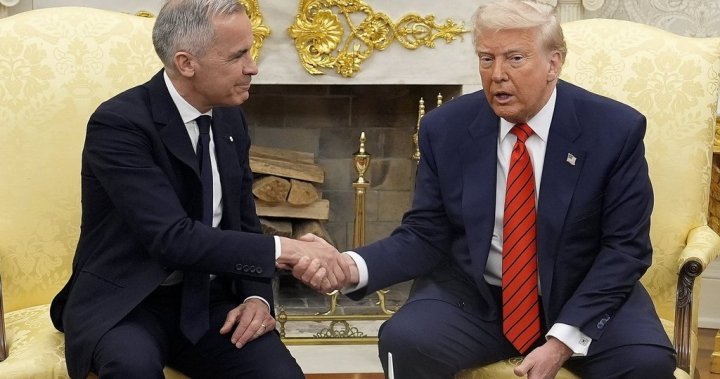Provincial and federal negotiators are making progress with the Trump administration on lowering U.S. President Donald Trump’s sweeping tariffs on Canada, Ontario’s trade representative in Washington says, suggesting a deal could be close at hand.
David Paterson said he’s hopeful that further progress in reducing those tariffs can be made by the time Trump and Prime Minister Mark Carney are face-to-face at the G7 Leader’s Summit in Alberta in two weeks.
Asked by Mercedes Stephenson during an interview that aired Sunday on The West Block if he’s getting the sense from Republican lawmakers that the White House is open to such a quick timeline, Paterson said, “Yes.”
“You have a choice of either engaging — and that’s what we do in Washington — and trying to make progress, or sit back and wait for some kind of perfect deal, and I think that could take a long time,” he said.
“We are now in a world where the formal trade agreements that we like to count on as being enforceable is now turning much more into a world where countries have to protect themselves.”
Trade negotiations have continued despite a whiplash week that saw a U.S. court briefly block the emergency orders used to justify many of Trump’s tariffs on Canada and most of America’s trading partners.

After a U.S. appeals court stayed the U.S. Court of International Trade’s ruling as it reviews the Trump administration’s challenge, Paterson said the world remains “in much of the same position.”

Get daily National news
Get the day’s top news, political, economic, and current affairs headlines, delivered to your inbox once a day.
The ruling did not affect tariffs on the steel, aluminum and auto sectors that have hit Ontario particularly hard.
“Many people have hoped that we would see the courts intervene on tariffs, many have hoped that the Congress would step up, but hope is not a strategy,” Paterson said.
“You need to keep on focusing on the things that are impacting your economy.”
Paterson says the bilateral talks with the U.S. on lowering tariffs can be separate from the broader renegotiation of the Canada-United States-Mexico Agreement on free trade (CUSMA) set to begin next year.
In the short term, however, he says Canada needs to secure its position as a key trading partner as other nations jockey for their own deals.
“Right now there’s one game that is available for people, and you have Japan, South Korea, the United Kingdom, the European Union, Vietnam — all these are in Washington trying to do bilateral deals to improve their trade situation,” he said.
The United Kingdom has already secured a framework trade agreement with the U.S. that Paterson says serves as both an example of what Canada could achieve for itself and an incentive to get a deal done that ensures its “relative competitive advantage.”
“Suddenly we find ourselves in a situation where a vehicle from the United Kingdom now has a lower tariff coming into the United States than a Chevrolet made in Ontario. That doesn’t make any sense,” he said. “That’s one of the discussion points that we have.
“We need to make more progress. We, as the signers of the CUSMA agreement, surely should have the best access to the United States market than everyone.”

Paterson said part of the mission he and others have undertaken is to educate the Trump administration on the important role Canada plays as one of the largest trading partners for the U.S. A majority of U.S. states do more trade with Canada than any other nation.
“You may hear the president say, ‘I don’t need your cars, I don’t need your natural resources.’ The truth is they do, and we know they do and they know they do,” Paterson said. “So that makes for a really good set-up for us in terms of being able to make progress.”
While Trump has continued with that dismissive rhetoric, Paterson said talks have gone very well with Republican lawmakers he hopes can make the case to the president and the administration.
“We’ve probably talked to 100 Republican senators and members (of the U.S. House of Representatives) over the last year — I certainly have not had a bad meeting with any of them. They love Canada,” he said.
“But they are giving the president, who won the election, the time to be able to take forward this agenda that he’s doing. They’re not pushing back on that in any meaningful way.”
Paterson pointed to last week’s trip to Ottawa by a delegation of U.S. senators, led by Republican Sen. Kevin Cramer of North Dakota, as the most recent public example of American officials recognizing Canada’s importance.
“A big thing that they understand and that we remind them is, ‘We’re your biggest supplier and we’re your biggest customer. So put us first in line and in your own self-interest, let’s get these tariffs down and start getting some certainty into the economy,” he said.
“That is a message that I think is really resonating in Congress and is really resonating increasingly even with people in the White House.”
© 2025 Global News, a division of Corus Entertainment Inc.






